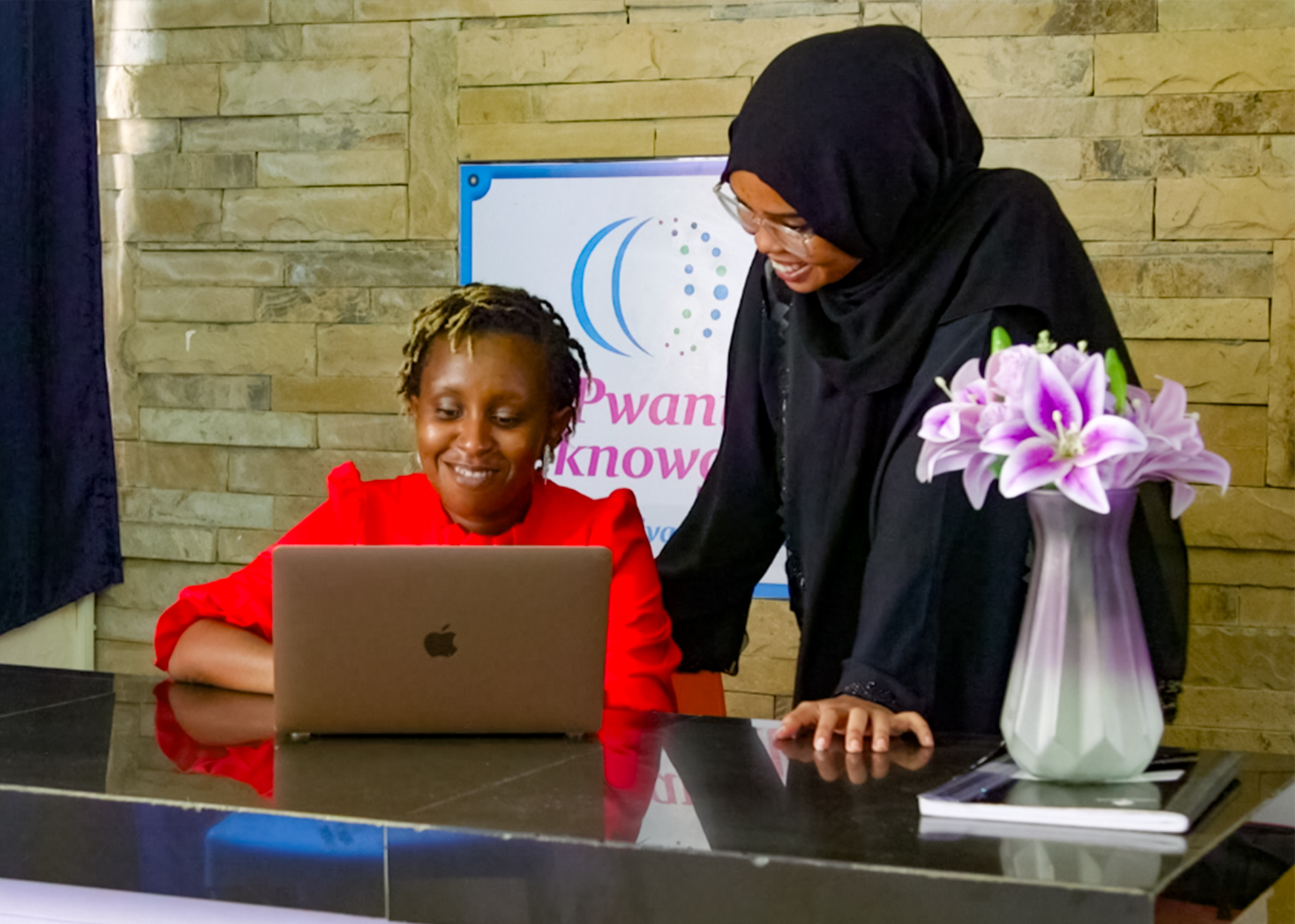It’s quiet at Pwani Teknowgalz. Really quiet. You’d almost think no one was home. Across from the reception counter, a handful of young women are engrossed in activities on their laptops. Many are wearing coloured hijabs; brown and black are the predominant colours, initially making it difficult to identify Latifah Noor.
It turns out that the 25-year-old is seated right at the front of the group, explaining a newly developed application to the woman seated next to her.
By rights, Noor should not be here. Her journey to a role at Pwani Teknowgalz, a community-based organisation in Mombasa, had its beginnings at high school when, after a visit by a group of women promoting STEM (Science, Technology, Engineering, and Mathematics) programs, she discovered a passion for technology. The women offered practical computer and IT lessons, and Noor grasped the opportunity with both hands.
“I got the opportunity to create my first application, which was a prototype. We went for competitions, and we became the third team,” she said.
Being brought up by a single mother, university was a challenge. After high school, she had to find work as a sales assistant. But her interests were always focused elsewhere.
“I came across the Pwani Teknowgalz page one day while browsing the internet. I recognized them from the pictures as the same group that came to visit us in high school. With my passion at heart, I decided to make the call.”
Pwani Teknowgalz, run by founder and Executive Director Ruth Kaveke, is located in the heart of Mombasa County. The non-profit works to empower girls and young women in marginalized communities in Kenya by providing them with employable practical STEM skills. The ultimate goal is to enable them to be self-sufficient and make a positive impact on the digital economy.
“I used to go there while the other girls were taking website development and Python classes. I would sit at the window and listen in on what they were learning. One day, as Ruth was finishing one of her classes, I decided to approach her with a question in relation to what she taught. She was taken aback because she hadn’t seen me in any of the classes,” Noor explained.
Kaveke was greatly inspired by Noor’s determination and persistence and decided to sponsor her. The young student became the first Pwani Teknowgalz beneficiary and was given the opportunity to participate in the program.
Kaveke’s own motivational story can be traced back to her shock at the low number of women IT students in her class at university.
“I attended the Technical University of Mombasa… Only 14 of 60 students in my computer science class were female. With that in mind, and after a harrowing experience as an IT intern in a male-dominated office, two of my friends and I decided to launch Pwani Teknowgalz,” Kaveke shared.
Kaveke wanted to create an environment where women like Noor could grow and be given opportunities in the field of technology. Initially, participants in the program were to pay 10,000 shillings (about US$65) per month for the training. Thanks to support from Kenyan corporates and other sponsors, Teknowgalz has been able to take on more non-paying participants.
“Thanks to funding from organizations like Safaricom and Close the Gap, we were able to enrol more ladies in the training program,” Kaveke explained.
The first physical location of the training centre was in Swahili Port, which was offered as a safe space with a community of techies and artists. The organisation has since moved to a new space but despite receiving thousands of applications, it is only able to train 12 to 18 girls at a time, due of capacity constraints.
Participants are trained in all aspects of computer technology, including website development.
“The Code Hack Program is one of the initiatives I am most passionate about. After high school, some of the girls don’t have enough money to attend college. They observe their pals sharing updates about their IT endeavours in university. What caught me off guard was the fact that the university students would still come to Pwani Teknowgalz for more training,” Kaveke said.
21-year-old, Rachael Oluoch, attending from far-off Siaya in Kisumu in the Lake Victoria region, is an example of the attendees who get an opportunity to advance their IT skills through Teknowgalz.
“I am an IT major in my second year at Technical University of Mombasa. We got our extended break early this year, and I wasn’t sure what to do with my time instead of going home. It was then that I encountered Teknowgalz online,” Oluoch said.
Oluoch was able to join the CODE HACK program and completed her training in the first week of December 2023.
“As I return to school, I feel like I have a wealth of knowledge. I have been able to learn a great deal from the curriculum that I was unable to learn in the university. Through the training, I was also able to acquire an internship, which has been my greatest blessing,” she shared.
Sharon Atieno, a Kenyan junior data scientist, who previously attended Teknowgalz, believes there is plenty of space for women in tech – if they can get the required training.
“To succeed in the tech business, you have to put in a lot of dedication. Lack of knowledge is the reason why many women are not pursuing it. I think there will be a significant increase in the number of women thanks to institutions that provide spaces for such opportunities,” Atieno said.
“It’s not easy; I wouldn’t say that it is,” she shared.
Noor has since returned to the program in the role of mentor, enabling her to instruct attendees in 3D printing, website construction, and digital marketing. PSYCp, her mental health application that supports people with mental health challenges by using pure technology, is still under development – and perhaps best represents her determination.
“It was in my vulnerable moments that I found strength. I reminded myself of the countless hours I had put into my career, the sleepless nights I had spent debugging code and my genuine interest and passion for web development. My competence and dedication served as my armour against the scepticism in the room,” she concluded.
bird story agency
Latifah Noor, a 25-year-old who discovered her passion for technology through a high school STEM program, is now a pivotal figure at Pwani Teknowgalz, a Mombasa-based non-profit that empowers young women with STEM skills. In her role, Noor teaches various tech skills and develops applications. Despite financial challenges, Noor pursued her passion, eventually joining Pwani Teknowgalz after recognizing the group from her high school days.
Founded by Ruth Kaveke, the organisation aims to provide practical skills to girls in marginalized communities and has grown thanks to support from Kenyan corporates. Kaveke, motivated by the low number of women in tech during her university days, created a supportive environment for women like Noor to thrive. The centre's training program is highly sought after, despite capacity constraints limiting the number of participants.
Participants, such as Rachael Oluoch and Sharon Atieno, have benefited significantly from the training programs, gaining knowledge and internships that positively impacted their careers. Noor, who continues to develop her mental health application, now mentors new attendees, highlighting the transformative power of dedication and support in the tech industry.






